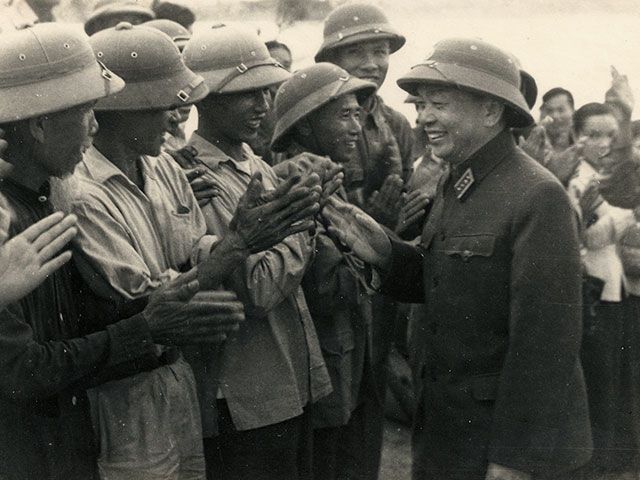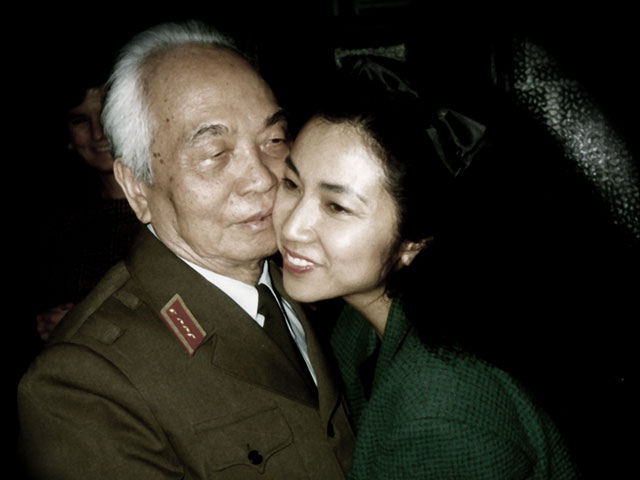(THIS ARTICLE IS MACHINE TRANSLATED by Google from Norwegian)
Director, actor and lyricist Tiana Alexandra Silliphant was born in Saigon, Vietnam, but had to flee with her family to Virginia because of the Vietnam War. The family became the state's very first Vietnamese immigrants. Throughout growing up, Silliphant was angered by the children around her, who blamed her for the innocent Americans dying in the war. As a protection, she chose to learn karate and eventually became Bruce Lee's only female apprentice. Through the karate master, she was introduced to Oscar-winning screenwriter Stirling Silliphant, and thus began her career, or rather life, as a documentary filmmaker. Because when she spends over 25 years making her documentary on Vietnam, it inevitably becomes a film about her own life. Tiana's deeply personal desire to understand the Vietnam War provides a completely unique representation of the country's modern history.
 Unique perspective. Among the many astonishing moments of this story, Silliphant's friendship with the "General" is at the center. Retired General Vo Nguyen Giáp, also known as the Red Napoleon for his efforts and significance for Vietnam's liberation struggle, never welcomes journalists' visits. At least Silliphant was told when she went to see him, but she didn't leave. She sent him a poem she had written about the country's war sufferings, and to everyone's surprise, she was then invited home to the war hero. This is how the documentary gets a perspective that has never been seen in previous portrayals of the subject, when Silliphant and Giáp enter into a friendship that will last the rest of their lives.
Unique perspective. Among the many astonishing moments of this story, Silliphant's friendship with the "General" is at the center. Retired General Vo Nguyen Giáp, also known as the Red Napoleon for his efforts and significance for Vietnam's liberation struggle, never welcomes journalists' visits. At least Silliphant was told when she went to see him, but she didn't leave. She sent him a poem she had written about the country's war sufferings, and to everyone's surprise, she was then invited home to the war hero. This is how the documentary gets a perspective that has never been seen in previous portrayals of the subject, when Silliphant and Giáp enter into a friendship that will last the rest of their lives.
We are presented to the national narrative in Vietnam today, which means that in 1954 the country freed itself from French oppression through intelligent tactics under the auspices of General Giáp. In an interview, Giáp says that he studied Napoleon and the French Revolution thoroughly – he had almost taken the formula from the French and now used it against them. When the country was about to be taken over by communists, the Americans intervened. The United States got a lot of critics who thought they could see a cynical opportunism; that the US would only show muscle to the communists after losing in Cuba, and that their position in Vietnam was really a small piece in the big game called the Cold War. But the Vietnam War soon became too prolonged and too bloody for it to be considered successful, both on a strategic and a symbolic level. Moreover, it helped to nurture a generation of intellectuals through the Paris 68 revolt, which further weakened the integrity of the United States in the world and made clear to all their imperialist motivations. While France became one of several nations that slowly but surely gave up its dreams of colonial rule, the United States still ran frontal attacks. The documentary is brought to light by the fact that today the United States is still far from fading its aggressive imperialism, even though it is aimed at other parts of the world. Maybe that's what the filmmaker's husband says: "The Vietnamese would rather forget the war, while the Americans are still obsessed with it."
Tiana's deeply personal desire to understand the Vietnam War provides a completely unique representation of the country's modern history.
Silliphant undoubtedly tries to appeal to both a Vietnamese and an American audience with the film's design language. That she has a background from Hollywood becomes visible through the use of sensational means, such as the narrator's voice that opens with the words "Once upon a time" – to dramatic string music mixed with war sound effects. The visual register consists of an energetic mix of archive material from a whole century and self-produced recordings from the 80s until today that in themselves make it worth watching the film. As a narrative, Silliphant has chosen a very open, sometimes essayistic and poignant approach, as if admitting that she does not actually know whether the American involvement was exclusively positive or negative – even few of the interviewees in the film have a clear answer to this. The fact that the film is also a sequel to the director's previous documentary on the subject, From Hollywood to Hanoi (1992), contributes to the feeling that one does not know the full context, and sometimes falls off the load. Also, the high pace of cutting and the apparent inexhaustibility of the source material do not help. The overwhelming breadth of the use of images makes the process around the selection itself a theme, as the director's challenges in making the film are not only an attempt to find red threads in a chaos, but also a hope to understand what it means to be Vietnamese.
 Unclear identity. "I speak English, think English, but dream Vietnamese," the filmmaker tells the camera, to emphasize his own unclear identity. "Empty the mind, be formless, be water," she says, straining to leave all her prejudices as she travels inland. On the journey, there are no individual statements that weigh heavier than others, there are no preconceived positions where an expert has greater authority than a random passing cyclist. Everyone has something to tell. But while Silliphant emphasizes that she needs blank sheets to understand the matter, the viewer is overwhelmed with information. The filmmaker here could have benefited from varying the pace more; Take thinking breaks and sharpen your focus. One of the points of the film is that directionlessness is an inevitable consequence of the situation, that the math can not or should not go up – but in any case, the recipient will feel left behind, as if you have not followed well enough in the history lesson. You probably profit from seeing this portrait several times.
Unclear identity. "I speak English, think English, but dream Vietnamese," the filmmaker tells the camera, to emphasize his own unclear identity. "Empty the mind, be formless, be water," she says, straining to leave all her prejudices as she travels inland. On the journey, there are no individual statements that weigh heavier than others, there are no preconceived positions where an expert has greater authority than a random passing cyclist. Everyone has something to tell. But while Silliphant emphasizes that she needs blank sheets to understand the matter, the viewer is overwhelmed with information. The filmmaker here could have benefited from varying the pace more; Take thinking breaks and sharpen your focus. One of the points of the film is that directionlessness is an inevitable consequence of the situation, that the math can not or should not go up – but in any case, the recipient will feel left behind, as if you have not followed well enough in the history lesson. You probably profit from seeing this portrait several times.
"The Vietnamese would rather forget the war, while the Americans are still obsessed with it."
General Giáp died at the age of 102 while the documentary was in post-production, and sadly could not see it in its final form. Such a poem first became Silliphant's entrance ticket to meet the general, her documentary is also a testimony to how art can facilitate dialogue across languages, cultures and ideologies. Maybe that is why she is again performing her poem towards the end of the documentary, and maybe that is why she is ending the poem with the words "New understanding".
Watch the movie here.






